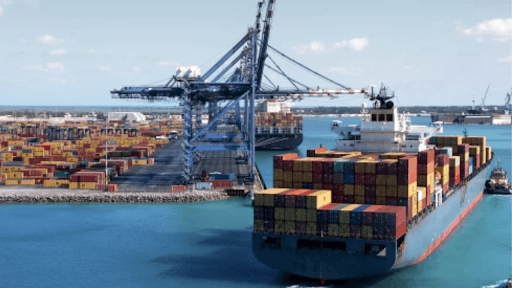The ocean, often referred to as the “blue highway,” plays a pivotal role in the global marketplace, serving as the backbone of international trade and commerce. With over 70% of the Earth’s surface covered by water, it is no surprise that maritime transport is the most efficient and cost-effective method of moving goods across vast distances. Sea freight service, in particular, is a crucial component of this global network, underpinning the flow of raw materials, finished products, and everything in between.
The Critical Role of Sea Freight Service
Sea freight, or ocean freight, involves transporting goods by cargo ships across the world’s oceans and seas. It is a dominant mode of transport for international trade, accounting for over 80% of global merchandise trade by volume. This mode of transport offers several advantages over other methods, such as air freight or rail, including lower costs, higher capacity, and the ability to transport a wide variety of goods.
Cost Efficiency
One of the primary reasons sea freight is so crucial to the global marketplace is its cost efficiency. Shipping goods by sea is significantly cheaper than air freight, especially for bulky or heavy items. The cost-effectiveness of sea freight is due to several factors, including the larger cargo capacities of ships compared to airplanes and the lower fuel consumption per ton-mile. This affordability enables businesses to keep their operational costs down, which can be critical in maintaining competitive pricing in the global market.
Capacity and Flexibility
Sea freight services can transport large volumes of goods at once. Container ships, for example, can carry thousands of containers, each loaded with diverse products ranging from electronics to raw materials. This large capacity makes sea freight ideal for bulk shipments, which are essential for manufacturing, agriculture, and energy industries.
Moreover, sea freight offers flexibility in terms of cargo types. Whether it’s perishable goods requiring specialized refrigerated containers or hazardous materials that need secure handling, maritime transport can accommodate a wide range of shipping requirements. This flexibility supports global trade by allowing businesses to export and import a broad spectrum of products.
The Impact on Global Trade
The role of sea freight in the global marketplace extends beyond just transporting goods. It significantly impacts economic growth, supply chain management, and international relations.
Economic Growth
The efficiency and cost-effectiveness of sea freight contribute to economic growth by facilitating international trade. Countries with access to major ports can engage in global trade more effectively, which can lead to increased economic opportunities, job creation, and development. For instance, major port cities like Shanghai, Singapore, and Rotterdam are pivotal economic hubs due to their strategic locations and the volume of goods they handle.
Supply Chain Management
Sea freight is integral to global supply chains, enabling businesses to source materials and distribute products efficiently. Companies often rely on a combination of sea freight and other modes of transportation to optimize their supply chains. For example, raw materials might be shipped by sea to a manufacturing facility, where they are processed and then distributed by land or air to various markets.
Efficient sea freight services can reduce lead times, minimize inventory costs, and improve overall supply chain reliability. This efficiency is crucial for industries with complex supply chains, such as electronics and automotive manufacturing, where timely delivery of components is essential.
International Relations
The ocean’s role in global trade also extends to fostering international relations. Maritime trade routes often cross multiple national boundaries, necessitating cooperation and agreements between countries. International conventions and regulations, such as the International Maritime Organization (IMO) regulations and the United Nations Convention on the Law of the Sea (UNCLOS), govern maritime activities and ensure safe and efficient shipping practices.
Challenges and Future Outlook
Despite its critical importance, sea freight faces challenges that could impact its role in the global marketplace. Environmental concerns, port congestion, and geopolitical tensions can affect the efficiency and reliability of maritime transport.
Environmental Concerns
The shipping industry is a significant contributor to global greenhouse gas emissions, primarily due to the burning of fossil fuels in ships. There is increasing pressure to adopt more sustainable practices and technologies, such as cleaner fuels, energy-efficient vessels, and improved waste management. The International Maritime Organization has set ambitious targets to reduce emissions, and the industry is gradually transitioning toward greener practices.
Port Congestion
Port congestion can disrupt the flow of goods and lead to delays and increased costs. Factors contributing to congestion include inadequate infrastructure, high volumes of trade, and logistical inefficiencies. Addressing these challenges requires investment in port infrastructure, adoption of advanced technologies, and improved coordination among stakeholders.
Geopolitical Tensions
Geopolitical tensions and trade disputes can impact sea freight operations by affecting shipping routes, tariffs, and trade policies. Navigating these challenges requires adaptability and strategic planning by businesses and policymakers.
Bottom Line
The ocean’s role in the global marketplace is indispensable, with sea freight services being a cornerstone of international trade and economic development. Its cost efficiency, capacity, and flexibility make it a preferred mode of transport for a wide range of goods. While environmental concerns, port congestion, and geopolitical tensions exist, ongoing efforts to address these issues will shape the future of sea freight and its contribution to the global economy. As we look ahead, the continued evolution of maritime transport will be crucial in sustaining and enhancing its vital role in the interconnected world of global trade.



